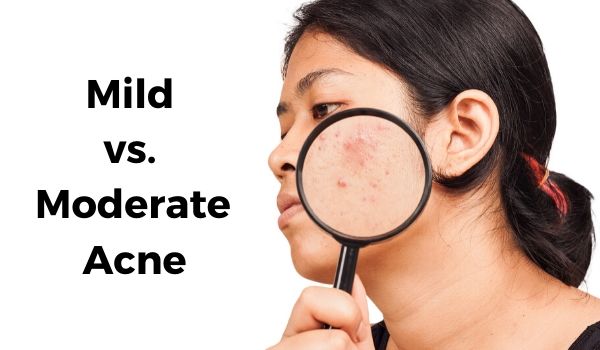Most of us have dealt with dreaded acne, but some may have it worse than others. Are you able to tell the difference in mild vs moderate acne? Acne is the most common skin condition in the US, so knowing the difference between the two will help you identify the right treatment for your case. We always recommend seeking the guidance of a dermatologist for your acne, no matter the severity, so you can get the treatment plan that’s best for your skin.
Acne can affect you at any age and is often related to genetics, hormonal changes, diet, and stress. Acne can also be caused by an inconsistent skin care regimen. While acne is not harmful to your health, it can be emotionally distressing. That’s why we’re here to help you identify if you have mild vs moderate acne, and what you can do about it.
Mild vs Moderate Acne: What’s the Difference?
Mild acne is the lowest classification for acne. Your acne is categorized as mild when you routinely only have a few breakouts. While you may consistently have blackheads and bumpiness, you will only occasionally have an inflamed pimple. While annoying, these breakouts are considered minor. Mild acne can progress into a moderate or severe form of acne, so it is best to treat your mild acne.
Moderate acne is characterized by noticeable breakouts. These breakouts often include not only blackheads and bumpy skin, but also papules and pustules. Papules are red and irritated looking bumps that can be painful to the touch. They are caused by hair follicles that become clogged by excess skin cells and oil. Papules often turn into pustules by becoming infected and filled with white, yellow, or cream-colored pus. Now that you can identify mild vs moderate acne, what are your treatment options?
Mild vs Moderate Acne Treatment
Your acne treatment will depend on if your acne has been diagnosed as mild or moderate acne. Your dermatologist can help you create an individualized treatment plan that is based on your lifestyle, skin type, and skin concerns.
While acne scarring does not typically occur until your acne is considered moderate, it is important not to pick at your face. Keeping your hands away from your face is also important to avoid excess oil build up in your pores. Maintaining a balanced diet and creating habits that minimize stress are also helpful in preventing and treating your acne.
Mild acne can often be treated with a consistent skin care regimen. Your dermatologist will suggest medicated cleansers or moisturizers. Products that may be prescribed by your dermatologist include products that contain benzoyl peroxide, salicylic acid, or alcohol and acetone. The type of medicated cleanser and/or moisturizer will be determined by your skin tone and the triggers for your acne.
Acne Medication
Moderate acne is more resistant to over-the-counter products. Your dermatologist may prescribe acne medication in addition to a careful skin care regimen. These medications can include antibiotics or hormonal medications. For convenience, we offer tretinoin cream 0.025% right from our office that you can pick up after your appointment.
There are many options for treating mild vs moderate acne. Speaking with your dermatologist will ensure that you are prescribed the best treatment options for you and your specific acne-related skin concerns.
Vujevich Dermatology Associates offers medical, surgical, and cosmetic dermatology from some of the most highly trained physicians and clinicians in the greater Pittsburgh area. You can reach our team at 412-429-2570 or visit our contact page to see all of our locations. You can also follow us on Facebook to see what’s new in the world of dermatology.

